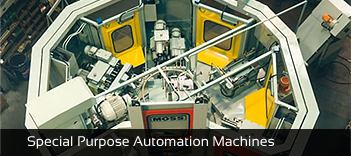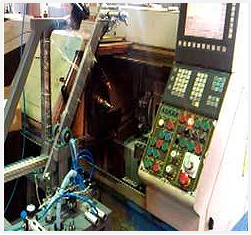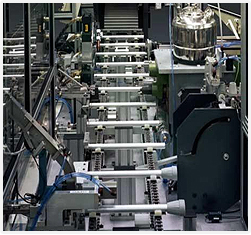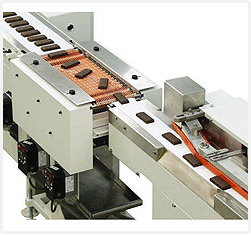Banking on the skills of our professionals, we manufacture, supply and trade a quality tested array of Special Purpose Automation Machines. The Special Purpose Automation Machines we offer is recommended by the clients for their precise use.
Special Purpose Automation Machines

Process Automation Systems

Owing to years of experience in the industry, we offer technically advanced range of Process Automation Systems that are manufactured with utmost accuracy. They are durable in nature and are configured with modern technologies and advanced tools. Our entire product range is delivered in varied grades and is delivered in well-defined time. We provide a range of process automation solutions to our customers.
We are well equipped to provide solutions for process automation like:
- Pick and Place
- Conveyor (Belt, Chain, Roller etc)
- Robot based Machine Tending, Part washing
- Cost effective Automatic Feeding Systems for CNC machines (For unmanned operations)
Assembly Automation Systems

Keeping in mind the diverse requirements of the clients, we offer an extensive range of Assembly Automation Systems that are durable in nature and are functionally advanced. Our entire product range is configured with modern technologies and ensures smooth finishing standards. They are quality assured in nature and are delivered in well-defined time. We provide a range of process automation solutions to our customers.
We are well equipped to provide solutions for assembly automation like
- High speed Automatic Assembly system
- Robot based assembly systems
- Precision Assembly systems
- Self check for Assembly
Packaging Automation Systems

We are enlisted amongst the reckoned names in the industry, offering wide range of Packaging Automation Systems that are manufactured with utmost accuracy. Our entire product range is functionally advanced in nature and is performance oriented. We offer them in varied technical grades and are delivered as per the exact preferences of clients. Moreover, we offer them with customized solutions. We provide a range of process automation solutions to our customers.
We are well equipped to provide solutions for packaging automation with below features:
- Packing based on Count
- Online packaging
- Packing based on weight
- Automatic Packing
- Thermal Sealing
- Ultrasound Sealing
- Tape based sealing
Frequently Asked Questions (FAQ's)
Special Purpose Automation Machine (SPAM) refers to a bespoke machine that is specifically designed to carry out designated tasks or processes within an industrial environment. These machines are meticulously tailored to meet the unique requirements of a particular application or production line, thereby enhancing efficiency and precision.
Unlike standard automation equipment, which is designed for general purposes, Special Purpose Automation Machines are custom-built to perform specialized tasks. They are engineered to address the specific challenges and requirements of a particular production process, making them highly efficient for their intended use.
Industries such as automotive, aerospace, electronics, pharmaceuticals, food and beverage, and consumer goods often employ Special Purpose Automation Machines to improve production efficiency, quality, and throughput.
Key components include custom mechanical parts, control systems (such as PLCs or PCs), sensors, actuators, human-machine interfaces (HMIs), and sometimes vision systems for inspection. The exact components vary based on the specific application.
These machines are designed and developed through a collaborative process involving engineers, designers, and the end user. The process includes requirement analysis, conceptual design, detailed engineering, fabrication, assembly, testing, and commissioning.
They can perform a wide range of tasks, including assembly, packaging, welding, cutting, testing, inspection, labeling, and material handling. The machines are tailored to handle specific processes efficiently.
Performance is measured based on criteria such as cycle time, accuracy, reliability, throughput, and overall equipment effectiveness (OEE). These metrics help in assessing how well the machine meets the intended goals.
Common applications include automated assembly lines, robotic welding cells, packaging systems, testing and inspection stations, pick and place systems, and custom machining operations.
These machines enhance production efficiency by automating repetitive and complex tasks, reducing human error, increasing speed, ensuring consistency, and allowing for continuous operation without fatigue.
Factors include the specific requirements of the task, available space, integration with existing systems, scalability, ease of maintenance, safety standards, and cost-effectiveness.
Special Purpose Automation Machines can be designed with flexibility in mind, allowing for adjustments and modifications to accommodate changes in production requirements. This may include modular components, programmable settings, and adaptable tooling.
Benefits include increased productivity, improved product quality, reduced labor costs, enhanced safety, greater precision, and the ability to perform tasks that are difficult or impossible for human workers.
Challenges can include high initial costs, lengthy development and customization time, the need for specialized technical expertise, integration with existing systems, and ensuring that the machine can adapt to future changes in production.
These machines are typically highly reliable when properly designed and maintained. Regular maintenance, timely updates, and adherence to operational guidelines are essential to ensure their longevity and performance.
Support can include initial installation and setup, operator training, regular maintenance services, troubleshooting and repair, software updates, and ongoing technical support from the manufacturer or specialized service providers.
Yes, these machines can often be upgraded or expanded to meet evolving needs. This can involve adding new features, enhancing control systems, integrating additional sensors, or modifying the machine to handle new tasks.







